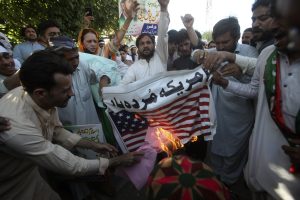Pakistan is sometimes informally addressed as “paranoidistan.” Conspiracies spread widely, especially when they are populist. Lately, Pakistan’s ousted Prime Minister Imran Khan, a popular leader indeed, has been successful in regaining his lost support by invoking anti-Americanism. He is adamant that the United States has interfered in the domestic politics of Pakistan. He publicly calls the current government an imported one.
Khan insists that he has been removed from office by a U.S. regime-change operation, and alleges that the military, which is a power broker in the country, was following the directions of the United States. While Khan’s party, the Pakistan Tehreek-e-Insaf (PTI), itself came into power after the 2018 elections with the support of the military, he has been able to create a paranoia, especially among the youth and overseas diaspora, via his strong social media presence and populist rhetoric.
What is important here is the question of what has made a significant part of the population believe Khan’s claims. After all, the allegations made by Khan have been called null and void by the country’s National Security Committee; civil society also considers the allegations as a mere populist move by Khan.
The United States has such a notorious history of interfering in others’ affairs that even when there is no proof and mere rhetoric, people in Pakistan are willing to buy the narrative.
No sentiments arise out of thin air. There are solid reasons why the average Pakistani has an unfavorable opinion about the United States. Anti-Americanism is prevalent among all sections of the society, in both the right and left wings. According to a Gallup survey, 72 percent of the population thinks the U.S. is an enemy and an alarming 80 percent of PTI supporters consider America an enemy.
Pakistan has been a U.S. ally for most of its history, and yet public sentiments have not been much in the favor of the United States.
Pakistan came into being 75 years ago on August 14, 1947 and has a much bigger, often hostile, neighbor. There is a common agreement in Pakistan that the U.S. has always favored India over Pakistan. This “friend of the enemy” is often seen with wary eyes. In contemporary times, the U.S. Indo-Pacific strategy has India at its heart, which makes the public in Pakistan see the U.S. as inherently anti-Pakistan.
Pakistan has been stuck between India’s strategic enmity in the east and Afghanistan’s volatile situation in the west for years. While officially Pakistan and the U.S. have worked together on Afghanistan, the fallout from these efforts has been devastating for Pakistan in practice.
During the Cold War era, the U.S. propped up the mujahideen, with the support of Pakistan’s intelligence agency, to use as proxies against the Soviet Union in Afghanistan. This social engineering on Afghan soil affected Pakistan brutally, in addition to turning Afghanistan into a failed state. Kalashnikov and drug culture fused into Pakistan. By the time the Soviet Union broke down, the mujahideen had become stronger, and the Americans did not care about handling the situation. Soon after the unfortunate 9/11 attacks, the U.S. invaded Afghanistan again and left it in tatters on August 15, 2021, when Kabul fell to the Taliban. Meanwhile, drone strikes in Pakistan generated feelings of loathing toward the United States – which helped propel Imran Khan to prominence in the first place.
The U.S. has always seen Pakistan through the Afghan lens and hence focused on supporting the military to achieve its aims. Consequently, the United States – despite being the champion of democracy worldwide, at least in theory – has effectively supported dictatorships in Pakistan throughout its political past. Pakistan has experienced 33 years of direct military rule, and was under hybrid rule for most of the rest of its history. The dictator Zia-ul-Haq allegedly had the blessing of the United States when he judicially murdered the most popular leader of the country, Zulfiqar Ali Bhutto.
Moreover, international financial institutions are blamed for Pakistan’s economic plights, and there is a widespread agreement that the U.S. pulls the strings of these institutions. Pakistan has gone to the IMF program 22 times to date and has been crippled with debts. The most recent loan deal with the IMF was supposed to be conceived in 2019, but it kept being delayed. At the moment, the IMF is in talks with Pakistan and a loan release is likely. This helped the PTI in crafting a narrative that the imported government has the support of the United States.
From security to politics to the economy, nearly every facet of Pakistan’s woes can be traced back to the United States in the public imagination.
Today, Imran Khan has created a narrative that a U.S. conspiracy that led to his ouster from office. But it must be remembered that Khan’s machinations are only a symptom of the anti-Americanism that has long prevailed in the country.

































